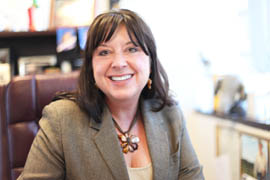State lawmakers crafting responses to election concerns

• Early Ballots: Dropped off at polling places on election day. Some ballots turned in prior to election day.
• Regular Provisional Ballots: Cast by voters whose names didn’t show up on precinct rosters or who they were marked as casting an early ballot.
• Conditional Provisional Ballots: Cast by those who don’t have the correct identification at the polls. Those voters have until end of the day Wednesday, Nov. 14, to get to their county’s elections office and show the necessary ID.
PHOENIX – The large number of provisional ballots cast in November has two lawmakers so far proposing ways to address the issue.
Rep. Chad Campbell, D-Phoenix, the House minority leader, said he is drafting legislation to form a committee to study election problems and recommend legislation.
Sen. Michele Reagan, R-Scottsdale, chairwoman of a new Senate Elections Committee, said she is aiming to cut down on problems with permanent early voting lists that led to many provisional ballots being cast.
Provisional ballots are given to voters at a polling places when there are questions about their identity or eligibility to vote. About 172,000 were cast in the general election, up from the 107,000 in 2008.
Concerns about provisional ballots and the time required to count all ballots remaining after election day drew national attention to Arizona and fueled protests by civil rights groups.
A common thread so far is that too many people on permanent early voting lists ended up voting in person. Better voter education on how early voting works and changing the way counties maintain and regulate lists will bring those numbers down, lawmakers and election officials said in interviews.
Any election reform in Arizona, legislative or administrative, would have to be cleared through the U.S. Department of Justice under the Voting Rights Act, which ensures that election procedures don’t discriminate against minorities in all or parts of 16 states.
Tammy Patrick, federal compliance officer for the Maricopa County Elections Department, said federal review can take as long as 60 days but could take longer if the federal government requests more information.
Campbell said the committee he’ll propose would study issues such as how many provisionals were cast and counted in recent elections, how counties educate voters and how people sign up for permanent early voting lists. The committee would have to submit suggested legislation by March 1.
The committee would include members of both chambers, election officials from Arizona’s two largest counties and a person appointed by the Secretary of State.
Campbell said he’s concerned most about provisional ballots disproportionately impacting minority areas.
“Based on some of the numbers we’ve seen, a lot of them seem to be coming from Latino and lower-income neighborhoods,” Campbell said. “I don’t think there’s any conspiracy here or it’s intentional – don’t get me wrong – I just think that there needs to be some type of analysis of why they’re casting more provisional ballots.”
Senate President Andy Biggs, R-Gilbert, created the Senate Elections Committee after the general election. Reagan, the chairwoman, said it would address some of the reported problems and help navigate all election-related bills.
One bill planned by Reagan would address concerns raised by county election officials that too many people on permanent early voting lists voted instead at polling places. She hadn’t decided exactly how to address the problem but said the goal is giving counties more flexibility to remove people from the lists.
“They need to have the ability to clean those lists up, but then we also need to be careful that people aren’t getting taken off that really like (mail ballots),” Reagan said.
About half of the provisional ballots during the last election were cast by voters on the list. Current law says voters have to ask in writing to be removed from lists.
Secretary of State Ken Bennett said counties can address the problem with flexibility and through education.
“A system that was designed to try to get as much of the vote in early so that it can be counted and released on election day ended up not working that way,” Bennett said.
Brad Nelson, elections director in Pima County, said he wants more voter outreach and education by the Secretary of State’s Office to explain to voters what being on the permanent early voting list entails. There were roughly 27,000 provisional ballots cast in Pima County, slightly more than half of which came from voters who should have voted by mail, he said.
“The majority of the lines were these people who had to vote provisionally,” Nelson said.
Representatives of some civil rights groups said they are worried that the proposed changes wouldn’t address what really happened on election day.
“Provisional ballots, long lines, people not on the rolls and they don’t know why – all of those things that I really think complicated and disenfranchised voters on election day, I haven’t heard that addressed,” said Roopali Desai, attorney for Promise Arizona in Action, one of the main groups that protested what its members said were disproportionately high provisional ballot rates and long lines in minority areas.
“What I think is really missing from this legislation is the involvement of community members,” she said. “What you don’t have are people who are actually on the ground.”
http://cronkitenewsonline.com/2013/01/lawmakers-crafting-responses-to-election-concerns/















